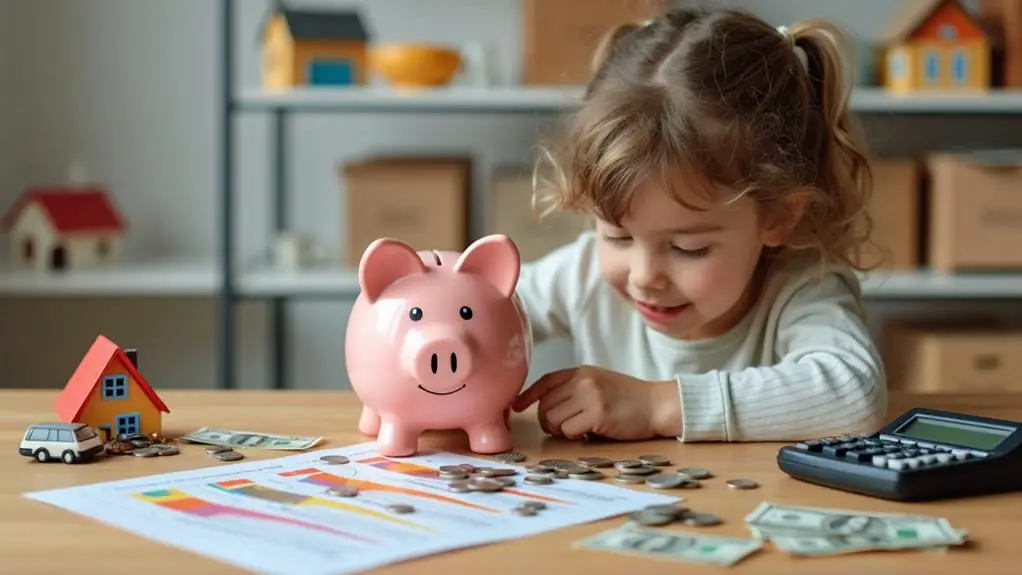Teaching Responsibility to Kids
As a parent and educator, I've seen firsthand how teaching responsibility to children can shape their future success. It's a journey that begins early and evolves as kids grow, but the benefits are immeasurable. I've found that age-appropriate tasks, clear expectations, and positive reinforcement are key ingredients in nurturing responsible behavior. But there's more to it than just assigning chores; it's about instilling values and life skills that'll serve them well into adulthood. So, how can we effectively guide our children towards becoming accountable, self-reliant individuals? The answer lies in a thoughtful approach that considers both short-term goals and long-term impact.
Key Takeaways
- Assign age-appropriate chores to match children's abilities and gradually increase responsibilities as they grow older.
- Establish consistent routines and clear expectations for daily tasks and homework to promote accountability.
- Introduce financial literacy early through allowances and savings accounts to teach money management skills.
- Use positive reinforcement and chore charts to encourage task completion and link responsibilities to rewards.
- Provide opportunities for children to learn from mistakes and reflect on their actions and consequences.
Understanding Child Responsibility
When it comes to understanding child responsibility, it's important to recognize that the process starts early and evolves as children grow. I've found that kids as young as 3-4 years old can begin learning responsibility through simple tasks like tidying toys.
As they become older kids, their responsibilities naturally increase.
To effectively teach kids about responsibility, I believe it's crucial to establish routines and consistent expectations. This helps children understand why acting responsibly matters.
It's significant to remember that kids will make mistakes, and that's okay. These moments provide valuable opportunities for learning and growth.
As a parent, I play an essential role in teaching responsibility by modeling responsible behavior and setting clear expectations.
I've learned that it takes time for kids to develop these skills, but with patience and guidance, they'll gradually learn to act responsibly.
Age-Appropriate Chores and Tasks
For children to develop a sense of responsibility, it's vital to assign age-appropriate chores and tasks. I've found that even kids as young as 3-4 years old can start with simple activities like tidying up toys and cleaning muddy boots. As they grow, their responsibilities should evolve to include more complex tasks.
To teach responsibility effectively, I make sure to:
- Establish consistent chores that match the child's age and abilities
- Create routines that set clear expectations for daily life
- Provide positive reinforcement for effort and task completion
While some may argue that responsibilities are time-consuming, I believe they're fundamental for a child's development. By giving kids age-appropriate tasks like making their beds or helping with dinner, we provide opportunities for them to learn from mistakes in a supportive environment.
This approach helps children embrace accountability and prepares them for future challenges.
Financial Literacy for Kids

Financial literacy is an essential life skill that parents can instill in their children from an early age. I believe introducing an allowance is an effective way to teach kids about money management and responsibility.
By encouraging them to save for desired items, I'm helping them appreciate the value of delayed gratification. I've found that using chore charts can link financial rewards to completed tasks, reinforcing the connection between work and income.
I make sure to teach my children basic financial terms, which helps them understand the concepts of income, expenses, and savings. Opening a savings account for my kids has given them practical experience in managing money and making financial decisions.
This approach sets a strong foundation for responsible financial behavior as they grow into adulthood.
Reinforcing Responsible Behavior
Building on the foundation of financial literacy, I've found that reinforcing responsible behavior is key to raising well-rounded, accountable children.
Teaching responsibility to kids from an early age helps them develop essential life skills. I've seen great success using positive reinforcement and clear expectations to encourage kids to take responsibility for their actions.
To effectively reinforce responsible behavior, I recommend:
- Implementing chore charts that link tasks to allowances
- Establishing consistent routines for homework and household responsibilities
- Encouraging reflection on actions and their consequences
Conclusion
I've learned that teaching responsibility to kids is a journey that starts early and evolves as they grow. By setting age-appropriate tasks, establishing routines, and offering positive reinforcement, I'm helping children develop essential life skills. I'm also using chores as a way to teach financial literacy and delayed gratification. Through this process, I'm not just preparing kids for adulthood, but I'm building their confidence and sense of accomplishment along the way.







